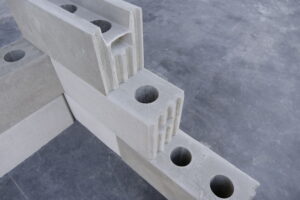 New Product – Foam Concrete Blocks
New Product – Foam Concrete Blocks
Unlike traditional concrete blocks which are made from a mix of sand, cement and stones, foam concrete blocks replace the stones with a stabilizing foaming agent. This mix causes the blocks to be lightweight, durable and environmentally friendly lending to a shorter construction period and lower overall construction cost.
Frequently asked questions and answers
Q: What are the benefits of using this material as opposed to traditional concrete blocks?
A: There are many benefits to both the consumer and the producer namely:
For the consumer, the advantages include:
- Cheaper in terms of completed installation vs traditional.
- Excellent insulator with respect to heat and sound.
- Faster to construct.
- Mould resistant.
- Lightweight, which serves to reduce foundation loads and therefore foundation costs.
- Recyclable.
- Can be finished just like a regular concrete block – but even easier.
For the producer, the advantages include:
- Low energy requirements.
- Fewer raw materials.
- No vibration required.
Q: How strong and durable are foam concrete blocks compared to traditional concrete blocks?
A: With respect to strength, buildings with typical spans (say 6m or 20ft) can be constructed using this material up to 10 floors easily.
Definitely more durable and resistant to cracking than traditional concrete blocks.
Q: Will a foam concrete structure be able to withstand natural disasters like hurricanes and earthquakes?
A: The weight of the foam concrete is about 1/4 that of ordinary concrete, so the seismic load generated from the use of foam concrete blocks is substantially reduced. At the same time, it is sufficiently heavy to comfortably resist hurricane force winds with no specific limitation, but very comfortably wind speeds under 170mph. To answer directly, it stands up very well to hurricanes and earthquakes.
Q: What’s the repair procedure in the event one has to close a penetration or repair a crack?
A: For cracks of a few millimetres, a suitable joint filler will be used that would adhere; and for larger penetrations application of a bonding agent and foam concrete infill will suffice.
Q: Are the blocks suitable for pool construction?
A: Yes.
Q: When will foam concrete blocks become available for purchase?
A: We are aiming to start production in July, 2021.
Q: What is the financial comparison to traditional concrete block?
A: The purchase price is the same, but a little less than twice as many can be installed at the same time compared to traditional block work. Also laying and rendering require much less material and labour, so overall installation costs are substantially less.
This page and additional information will be updating as we get closer to mass production.

